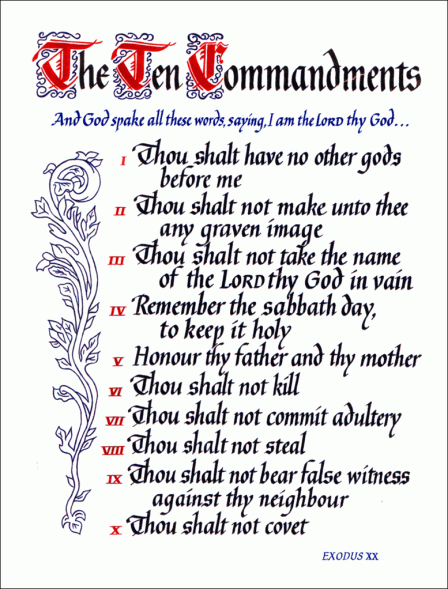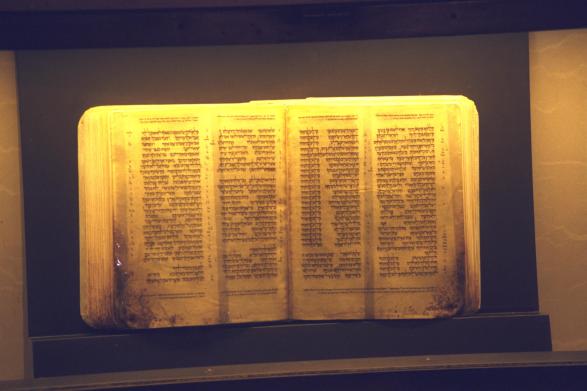Bloor Lansdowne Christian Fellowship – BLCF Church Message for Sunday:
‘Keeping Jesus as Lord in Our Words and Heart’
© May 26, 2013, by Steve Mickelson
Let us pray…
The message shared at BLCF last Sunday, described how those who view religion with a purely legalistic outlook without faith, can act like excess baggage and impede their faith walk. As a specific example, we looked at the Pharisee, Nicodemus, who had difficulty with Jesus’ teachings about being born again in the Spirit. Though Nicodemus had head knowledge of God’s laws in the scriptures, he had little or no faith understanding of God’s spiritual intent behind those commandments. Without faith or belief that Jesus came to end our judgment under the law, we face the impossible task of being perfect within the law to prevent our own condemnation. The conclusion of last week’s message was that all the other things of this world are of little importance to God, except our faith in Him, which God desires most from us. To grow our faith, we need to discard the excess baggage of the world, focus on the gifts of the Holy Spirit and the gospel of the Jesus.
So you may ask what are the risks of taking a purely legalistic approach to our faith? Before we discuss the penalty or remedy, let’s talk about which laws which govern us. We have two sets of laws that were given to the people of Israel. First, we have God’s 10 Commandments, written on stone tablets by God, and were carried inside the Arc of the Covenant. Next, we have the Ceremonial Law or Mosaic Law, written by Moses, which was carried as a book on the side of the Arc of the Covenant. There is an illustration in today’s bulletin which helps us to distinguish one from another.
God expects us to abide by His 10 Commandments. Now the legalist might question the name of these God given laws.
According to Wikipedia, the Ten Commandments are called, in biblical Hebrew, עשרת הדברים (transliterated Asereth ha-D’bharîm) and in Rabbinical Hebrew עשרת הדברות (transliterated Asereth ha-Dibroth), both translatable as “the ten words”, “the ten sayings” or “the ten matters”. The Tyndale and Coverdale English translations used “ten verses”. The Geneva Bible appears to be the first to use “tenne commandements”, which was followed by the Bishops’ Bible and the Authorized Version (the “King James” version) as “ten commandments”. Most major English versions follow the Authorized Version.
The English name “Decalogue” is derived from Greek δεκάλογος, dekalogos, the latter meaning and referring to the Greek translation (in accusative) δέκα λόγους, deka logous, “ten words”, found in the Septuagint (or LXX) at Exodus 34:28 and Deuteronomy 10:4.
The stone tablets, as opposed to the commandments inscribed on them, are called לוחות הברית: Luchot HaBrit, meaning “the tablets of the covenant”.
http://en.wikipedia.org/wiki/Ten_Commandments
So it is not surprising that some scholars will even confuse Ceremonial Laws of Moses with God’s Commandments. It is the Ordinances and Decrees that Jesus removed by His crucifixion, not God’s 10 Commandments.
Just as important as keeping God’s Laws, both to God and ourselves, is the need to keeping faith with the Lord. While a legalist may say that they abide by both the law and the spirit of the law. But that is not the same as abiding by the law of the spirit, which is, in essence, keeping the faith with the Lord.
In today’s first Scripture verse, Luke 11:37-52, we have Jesus invited by a Pharisee to dine with him. Remember from last week’s account of Nicodemus that the definition of a Pharisee is as follows:
Pharisee (noun):
1. a member of an ancient Jewish sect that differed from the Sadducees chiefly in its strict observance of religious practices, liberal interpretation of the Bible, and adherence to oral laws and traditions.
2. a self-righteous person; a hypocrite.
The Pharisee was astonished that Jesus did not wash before dinner, which was a Jewish Ceremonial observance, not for reasons of hygiene. The washing supposedly made one clean before God, something mandated by man, not by God. The reaction of the Pharisee gave Jesus an opportunity to criticise the Pharisee for being focused on the relative superficiality of being focused on outward appearances and what is on the inside, where greed and wickedness contradict an outward demeanor of righteous. Jesus gave the desire to have the best seats in the synagogues and the desire to be acknowledged in the public marketplaces as examples of the Pharisee’s greed. As for wickedness, Jesus pointed to Pharisee injustice to others and avoidance of love to God.
When a lawyer objected to what Jesus said, by characterizing these truthful observations as an insult not just to the Pharisees, but as an insult to lawyers as well. By defending the criticisms that Jesus made of the Pharisees and siding with them, the lawyer attempted to try to make such behaviour as righteous and justified. This opened the door for Jesus to observe how lawyers do behave fit the definition of a Pharisee, being self-righteous hypocrites. Jesus commented how the lawyers saw fit to burden people, rather than to help them. Jesus spoke of the hypocrisy shown by building tombs and monuments to the prophets who were killed by the fathers of the lawyers. And being educated and learned, the lawyers have had an opportunity to practicing faith, which they not only avoided but acted as a stumbling block to others finding faith. This is a perfect example of one reading the scriptures with the mind, but not the heart. By obsessing over the words and not the intent of God’s word, they miss the true meaning of the scriptures for both themselves as well as for those to whom they read the verses.
But is missing the mark of comprehending and sharing the scriptures limited to just Pharisees and Lawyers? Do some Christians recite verses from the Holy Word by rote, as if the words alone have some magical power? Let’s have look at how Jesus taught us to pray.
If you look on the back page of today’s bulletin, you will see two examples of what we commonly refer to as the Lord’s Prayer. The first recorded in the gospel of Luke, Chapter 11, verses 1-4, was a response to one of the disciples request to be taught how to pray, as John the Baptist had taught to his disciples. Thus we have:
2 And he said to them, “When you pray, say:
“Father, hallowed be your name.
Your kingdom come.
3 Give us each day our daily bread,
4 and forgive us our sins,
for we ourselves forgive everyone who is indebted to us.
And lead us not into temptation.”
The other version of the Lord’s Prayer comes from Matthew, Chapter 6, verses 5 to 14, which is also found on the back of the bulletin, which Jesus spoke as part of His Sermon on the Mount. Before he began to pray, Jesus admonished those present not to behave like the hypocrites, who we now know to be the Pharisees:
5 “And when you pray, you must not be like the hypocrites. For they love to stand and pray in the synagogues and at the street corners, that they may be seen by others. Truly, I say to you, they have received their reward. 6 But when you pray, go into your room and shut the door and pray to your Father who is in secret. And your Father who sees in secret will reward you. 7 “And when you pray, do not heap up empty phrases as the Gentiles do, for they think that they will be heard for their many words. 8 Do not be like them, for your Father knows what you need before you ask him. 9 Pray then like this:
“Our Father in heaven,
hallowed be your name.
10 Your kingdom come,
your will be done,
on earth as it is in heaven.
11 Give us this day our daily bread,
12 and forgive us our debts,
as we also have forgiven our debtors.
13 And lead us not into temptation,
but deliver us from evil.
14 For if you forgive others their trespasses, your heavenly Father will also forgive you
But we see a variance between the two versions of the prayer, not only between those recorded in Luke and Matthew. We find differences in the same verse, from one Bible translation to another! How can this be? The best explanation may be found in the history of these translations:
The Lord’s Prayer is a central prayer in Christianity also commonly known as Our Father and in the Latin tongue as the Pater Noster. In the New Testament of the Christian Bible, it appears in two forms: in the Gospel of Matthew as part of the Sermon on the Mount, and in the Gospel of Luke,which records Jesus being approached by “one of his disciples” with a request to teach them “to pray as John taught his disciples.” The prayer concludes with “deliver us from evil” in Matthew, and with “lead us not into temptation” in Luke. The first three of the seven petitions address God; the second four are prayers related to our needs and concerns. The liturgical form is Matthean. Some Christians, particularly Protestants, conclude the prayer with a doxology, an addendum appearing in some manuscripts of Matthew, but originating in an ancient Christian writing known as the Didache.
Though Matthew 6:12 uses the term debts, the older English versions of the Lord’s Prayer uses the term trespasses, while ecumenical versions often use the term sins. The latter choice may be due to Luke 11:4, which uses the word sins, while the former may be due to Matthew 6:14 (immediately after the text of the prayer), where Jesus speaks of trespasses. As early as the third century, Origen of Alexandria used the word trespasses (παραπτώματα) in the prayer. Though the Latin form that was traditionally used in Western Europe has debita (debts), most English-speaking Christians (except Scottish Presbyterians and some others of the Reformed tradition), use trespasses. The Established Presbyterian Church of Scotland, the Church of Christ, Scientist, as well as the Congregational denomination follow the version found in Matthew 6 in the Authorized Version (known also as the King James Version), which in the prayer uses the words “debts” and “debtors”.
The Latin version of this prayer has had cultural and historical importance for most regions where English is spoken. The text used in the liturgy (Mass, Liturgy of the Hours, etc.) differs slightly from that found in the Vulgate Jerome is considered to be responsible for changes such as the use of “supersubstantialem” instead of “cotidianum” as a translation of “ἐπιούσιον” (epiousios) in the Gospel of Matthew, though not in the Gospel of Luke.
The doxology associated with the Lord’s Prayer is found in four Vetus Latina manuscripts, only two of which give it in its entirety. The other surviving manuscripts of the Vetus Latina Gospels do not have the doxology. The Vulgate translation also does not include it, thus agreeing with critical editions of the Greek text.
In the Latin Rite liturgies, this doxology is never attached to the Lord’s Prayer. Its only use in the Roman Rite liturgy today is in the Mass as revised after the Second Vatican Council. It is there placed not immediately after the Lord’s Prayer, but instead after the priest’s prayer, Libera nos, quaesumus…, elaborating on the final petition, Libera nos a malo (Deliver us from evil).
There are several different English translations of the Lord’s Prayer from Greek or Latin, beginning around AD 650 with the Northumbrian translation. Of those in current liturgical use, the three best-known are:
|
Other English translations are also used.
http://en.wikipedia.org/wiki/Lord%27s_prayer
It is a common fallacy among some Christians and even certain Biblical scholars, that the Bible is based on one single set of manuscripts housed in some library, monastery or museum. All they have to do is go to this place and reference these ancient scrolls to obtain a definitive translation of the scriptures. This misconception likely comes from present lawgivers being able to see and reference the original historical documents such as the Canadian Charter of Rights, the US Constitution or the British Magna Charta.
Well, it is not quite that simple. Let us briefly look at where scholars obtained the source for the modern Bibles we use today:
The Hebrew Bible or The Tanakh was mainly written in Biblical Hebrew, with some portions (notably in Daniel and Ezra) in Biblical Aramaic. From the 9th century to the 15th century, Jewish scholars, today known as Masoretes, compared the text of all known biblical manuscripts in an effort to create a unified, standardized text.
A series of highly similar texts eventually emerged, and any of these texts are known as Masoretic Texts (MT). The Masoretes also added vowel points (called niqqud) to the text, since the original text only contained consonant letters. This sometimes required the selection of an interpretation, since some words differ only in their vowels—their meaning can vary in accordance with the vowels chosen. In antiquity, variant Hebrew readings existed, some of which have survived in the Samaritan Pentateuch and other ancient fragments, as well as being attested in ancient versions in other languages.
The New Testament was written in Koine Greek.
The discovery of older manuscripts, which belong to the Alexandrian text-type, including the 4th century Codex Vaticanus and Codex Sinaiticus, led scholars to revise their view about the original Greek text. Attempts to reconstruct the original text are called critical editions. Karl Lachmann based his critical edition of 1831 on manuscripts dating from the 4th century and earlier, to demonstrate that the Textus Receptus must be corrected according to these earlier texts.
The autographs, the Greek manuscripts written by the original authors, have not survived. Scholars surmise the original Greek text from the versions that do survive. The three main textual traditions of the Greek New Testament are sometimes called the Alexandrian text-type (generally minimalist), the Byzantine text-type (generally maximalist), and the Western text-type (occasionally wild). Together they comprise most of the ancient manuscripts.
Alternative word order, the presence or absence of an optional definite article (“the”), and so on. Occasionally, a major variant happens when a portion of a text was accidentally omitted (or perhaps even censored), or was added from a marginal gloss. Fortunately, major variants tend to be easier to correct. Examples of major variants are the endings of Mark, the Pericope Adulteræ, the Comma Johanneum, and the Western version of Acts.
Early manuscripts of the letters of Paul and other New Testament writings show no punctuation whatsoever. The punctuation was added later by other editors, according to their own understanding of the text.
So we see that our current Bible comes from a variety of sources. Translators were supposed to use as many as 600 Greek manuscripts in order to avoid a skewed or misleading translation. Unfortunately, some of the early translators relied on as few as 40 Greek manuscripts in their translations, because geography and politics made universal access impractical. Over time the availability to more sources enabled corrections to the translations. A couple of years ago, while researching a message on the Holy Trinity, I came upon a good example of such a change. On the bottom of the second page of your bulletin, you will see two translations of 1 John5:7-8:
The King James states:
7 For there are three that bear record in heaven, the Father, the Word, and the Holy Ghost: and these three are one.
And the English Standard states:
7 For there are three that testify: 8 the Spirit and the water and the blood; and these three agree.
Changes to a verse’s translation by the removal, addition or change of the wording has led to some Christians claiming a demonic conspiracy in effect to alter the Word of God, particularly the King James Version when compared to the newer translations. This would be the kind of reaction one would expect from the Pharisees and scribes. Such disagreements are not the work of the Holy Spirit amongst the Christian body of believers and acts to hinder others from hearing the Gospel. Our commission is not to spend our time on petty arguments amongst ourselves over the merits of one translation over another, for the Spirit is absent from such debates. We are commissioned to share God’s Word and promote an appreciation and love for God, in order to share the Gospel of Jesus Christ with the help of the Holy Spirit. As the Apostle Paul said in his epistle, Romans 10:5-13 (ESV), entitled: ‘The Message of Salvation to All’
5 For Moses writes about the righteousness that is based on the law, that the person who does the commandments shall live by them. 6 But the righteousness based on faith says, “Do not say in your heart, ‘Who will ascend into heaven?’” (that is, to bring Christ down) 7 “or ‘Who will descend into the abyss?’” (that is, to bring Christ up from the dead). 8 But what does it say? “The word is near you, in your mouth and in your heart” (that is, the word of faith that we proclaim); 9 because, if you confess with your mouth that Jesus is Lord and believe in your heart that God raised him from the dead, you will be saved. 10 For with the heart one believes and is justified, and with the mouth one confesses and is saved. 11 For the Scripture says, “Everyone who believes in him will not be put to shame.” 12 For there is no distinction between Jew and Greek; for the same Lord is Lord of all, bestowing his riches on all who call on him. 13 For “everyone who calls on the name of the Lord will be saved.”
Again, we see that the key to salvation and forgiveness from God lies in our heart, as an expression of our faith in the sacrifice and resurrection of Jesus, and our testimony to the truth of God’s love.
Let us pray…
Hymn #3: God, Our Father, We Adore Thee






Thanks for the auspicious writeup. It if truth be told was a leisure account, at first glance far too complex is introduced in an agreeable and understandabe manner by you! By the way, how could we be in contact?
– Kit Tribolet
LikeLike
We may be cotacted via email at:
blcfchurch@yahoo.ca or messaged on our web page: blcfchurch.ca
LikeLike
Fascinating blog! Is your theme custom made or did you download it from somewhere? A design like yours with a few simple adjustements would really make my blog stand out. Please let me know where you got your design.
Bless you
Gary Parmer
LikeLike
We BLOG WordPress.com and use the free Quintus template. I use an Olympus digital camera, (Olympus model SP600UZ Camera), which has the built-in feature of capturing an image in a line drawing format. The background image is one such image taken of the front of the church. I try to illustrate postings on the BLOG with line drawing illustrations that complement the topic. All sermons are transferred from the original Word document (authored in Office 2007/Word) using a cut and paste of the document using visual editing (as opposed to HTML format). The web BLOG is the base/free page and template, using no optional or commercial templates or features. I hope that explain how we get the BLOG to look this way and may help you in the future.
These sermons are from what I have shared for the Praise and Worship Services at Bloor Lansdowne Christian Fellowship where I preach from the pulpit on Sunday Mornings. BLCF does not employ a web master or commercial source for this or our other BLOG/Web sites. I used a template provided by wordpress.com which suited the line graphic photos that I took of BLCF Church. If you look at the bottom of these messages, you will see the free theme, Quintus, for this BLOG provided by wordpress.com, which is as follows: Blog at WordPress.com. | The Quintus Theme.
Blessings,
Steve Mickelson
Bloor Lansdowne Christian Fellowship – BLCF Church
LikeLike
Hi there! This is my 1st comment here so I just wanted to give a quick shout out and tell you I truly enjoy reading your articles. Can you suggest any other blogs/websites/forums that go over the same topics?
Appreciate it!
Malcolm Jacques
LikeLike
Sorry Malcolm, not with the same content and format as this BLOG. Perhaps if do a search by Google for “Christian sermons BLOG”, you may find something like ours.
Blessings,
BLCF
LikeLike
Hey there and thank you for your information – I’ve certainly picked up anything new from right here. I did however expertise a few technical issues using this site, as I experienced of reload the site lots of times previous so I could get it to load properly. I had been wondering if your web host is OK? Not that I’m complaining, but the slow loading times will very frequently affect your placement in google and could damage your high-quality score if ads and marketing with Adwords. Anyway I’m adding this RSS to my email and could look out for a lot more of your respective intriguing content.
Ensure that you update this again very soon.
– Claude Knott
LikeLike
Hello Claude,
Thanks for the message. I am sorry that you had a problem with multiple reloads required to get the page to load. I do not know whether the problem you describe is with the wordpress.com server or is related to the servers or other hardware or software issues, as you are the first to describe this sort of problem. I have not experienced the problem you describe, and I log on to the BLOG page on a regular basis. Hopefully, the problem for you will be identified and corrected soon.
Blessings,
BLCF
LikeLike
Awesome blog! Many thanks!
Shileen Mathes
LikeLike
Very nice post. I just stumbled upon your weblog and wanted to say that I’ve truly enjoyed browsing your blog posts. After all I’ll be subscribing to your feed and I hope you write again very soon!
LikeLike
Highly energetic blog, I enjoyed that a lot.
LikeLike
A big round of applause for the author of this publish! Great job, man. You’re a specialist. You need to be example for everybody website owners and bloggers.
LikeLike
I have read so many articles on the topic of the blogger lovers
however this piece of writing is in fact a good paragraph, keep it up.
LikeLike